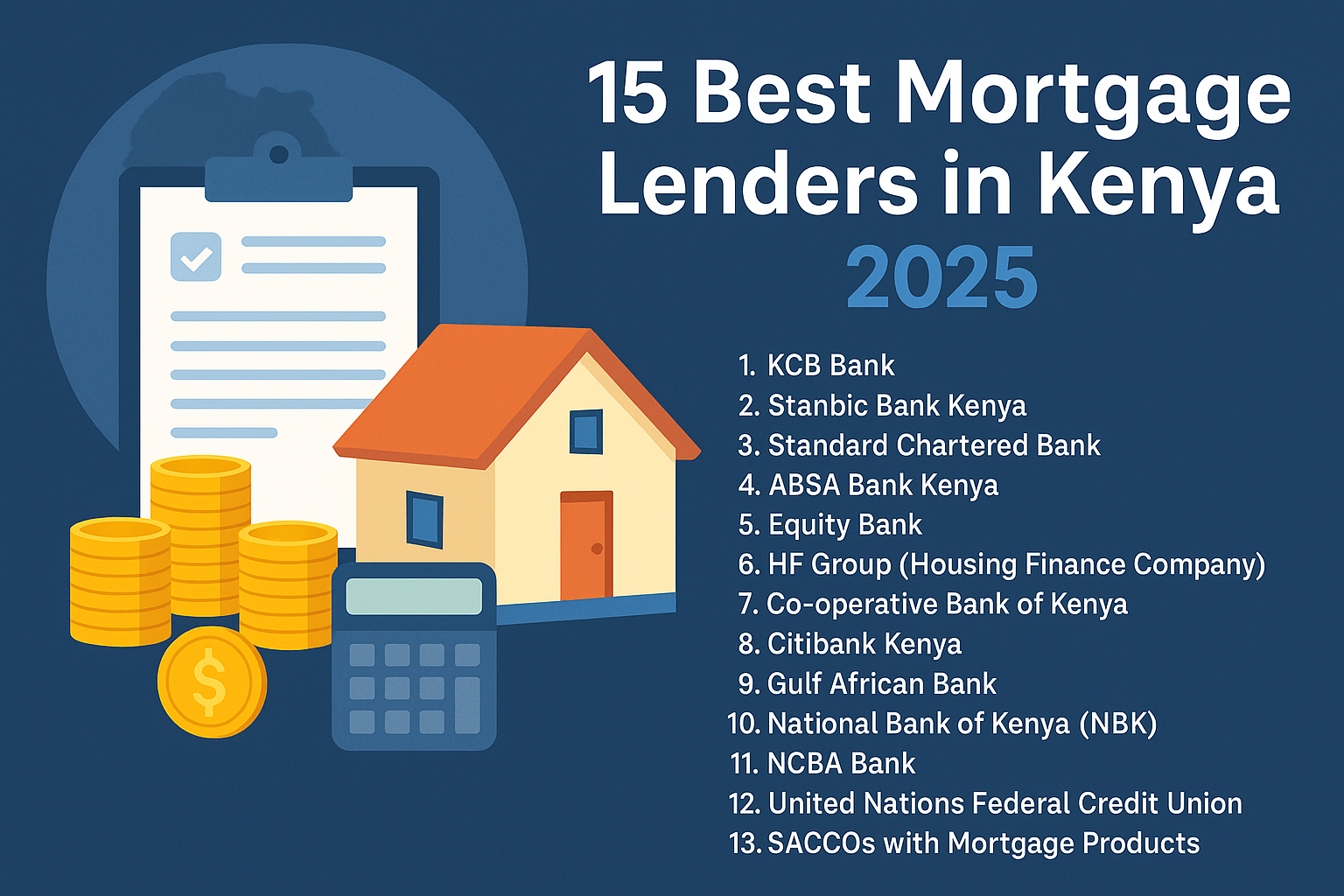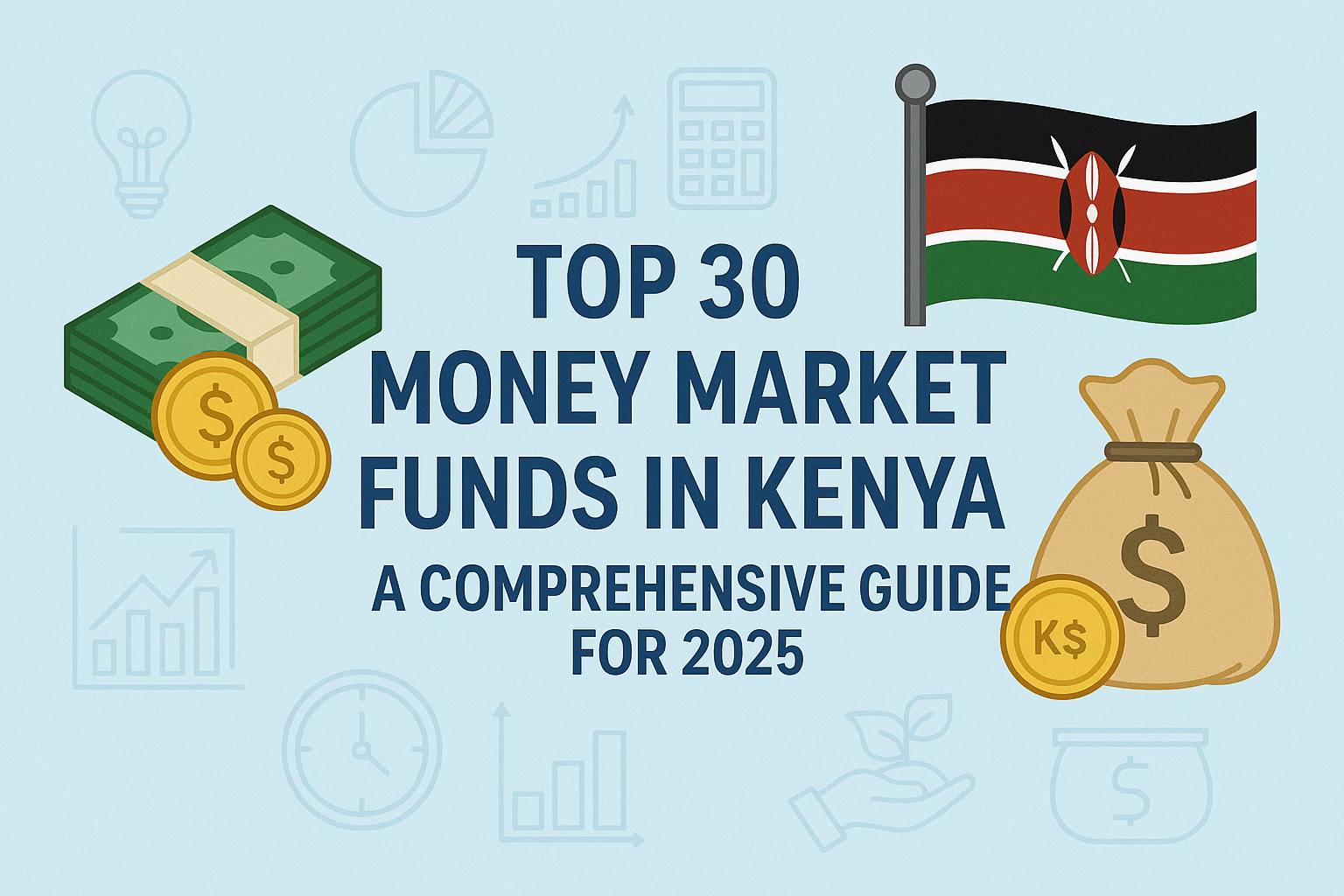Contents
- Introduction
- Kenya Mortgage Refinance Company (KMRC): The Backbone of Affordable Housing
- Top 15 Mortgage Lenders in Kenya
- KCB Bank
- Stanbic Bank Kenya
- Standard Chartered Bank
- ABSA Bank Kenya
- Equity Bank
- HF Group (Housing Finance Company)
- Co-operative Bank of Kenya
- Citibank Kenya
- Gulf African Bank
- National Bank of Kenya (NBK)
- NCBA Bank
- United Nations Federal Credit Union (UNFCU)
- National Housing Corporation (NHC)
- SACCOs with Housing Finance Products
- Pension-Backed Mortgage Schemes
- What Makes a Mortgage Lender “Best”?
- Tips for Borrowers
- Challenges and Outlook
- FAQs
- Conclusion
Owning a home is one of the biggest financial milestones for many Kenyans. Yet, for most households, paying for a house in cash is almost impossible. Mortgages step in as the bridge, making homeownership a reality by spreading payments over many years.
In Kenya, the housing deficit is estimated at more than 2 million units, with demand growing by over 250,000 units annually. Unfortunately, only a fraction of this demand is met each year. A key barrier has been the limited access to affordable financing. For years, mortgage penetration in Kenya remained at less than 30,000 active mortgage accounts, serving only the upper-middle class and high-income earners.
However, recent policy reforms, including the establishment of the Kenya Mortgage Refinance Company (KMRC), are beginning to reshape the market. KMRC provides long-term refinancing to commercial banks and SACCOs at concessional rates, enabling them to pass on lower interest rates to customers. Coupled with partnerships between banks, developers, and government housing projects, mortgage financing is becoming more accessible.
With that in mind, here are the 15 best mortgage lenders in Kenya in 2025, their strengths, and what you should consider before signing that loan agreement.
Kenya Mortgage Refinance Company (KMRC): The Backbone of Affordable Housing
Although not a lender to individuals, the Kenya Mortgage Refinance Company deserves mention because of its role in driving down mortgage rates. By refinancing loans to banks at around 5%, KMRC enables institutions to lend to homebuyers at more affordable rates—sometimes as low as 9%.
This has been a game-changer, especially for first-time homeowners and those seeking properties under the government’s Affordable Housing Programme. Many of the banks highlighted below now rely on KMRC funding to structure their low-cost housing loans.
1. KCB Bank
KCB is the largest mortgage lender in Kenya. Its Affordable Housing Mortgage product stands out because it allows up to 105% financing, covering not only the purchase price but also related costs such as stamp duty, legal fees, or even construction costs. This means a buyer can step into homeownership with little to no upfront savings.
KCB offers both fixed and variable interest rates, with repayment periods stretching up to 25 years. Salaried employees, self-employed individuals, and even diaspora clients can qualify. The bank also has strong developer partnerships, making it easier to process financing for approved projects.
2. Stanbic Bank Kenya
Stanbic has positioned itself as a strong player in real estate financing. It offers purchase, construction, and “buy-and-build” loans, giving flexibility for those who want to acquire land and build in phases.
The bank is known for its partnership approach, working with developers like Fanaka Real Estate to pre-approve housing projects and simplify the financing process. Its repayment terms of up to 25 years and competitive rates make it ideal for young professionals looking for manageable monthly installments.
3. Standard Chartered Bank
Standard Chartered targets middle- to high-income clients with its home loan products. Customers can borrow up to KES 100 million, with financing covering up to 100% of the property value.
Its key advantage lies in long repayment periods of up to 25 years and relatively lower fees compared to some local banks. For clients seeking large-ticket mortgages or premium properties, Standard Chartered is often a go-to lender.
4. ABSA Bank Kenya
ABSA offers one of the most diverse mortgage portfolios in the market. Borrowers can access loans for:
- Buying a home
- Building on purchased land
- Equity release (unlocking cash from an existing property)
- Refinancing loans from other banks
ABSA also supports buyers of National Housing Corporation (NHC) projects and government-affordable housing schemes, making it a good fit for mid-income households.
5. Equity Bank
Equity Bank’s strength lies in its wide customer base and branch network across the country. While its mortgage tenors are typically shorter—often capped at 15 years—it has flexible eligibility terms that attract many middle-class families.
Equity also allows customers to leverage their SACCO membership or salary accounts for easier approvals, making it a practical choice for many Kenyans who may not qualify under stricter banks.
6. HF Group (Housing Finance Company)
HF Group is Kenya’s oldest mortgage lender, specializing exclusively in housing finance for decades. It offers financing for home purchases, construction, and property development.
Borrowers can access up to 90% financing, with repayment terms of up to 20 years. While HF faced challenges in recent years, it remains a go-to lender for property developers and individuals seeking specialist housing finance solutions.
7. Co-operative Bank of Kenya
Through its Good Homes Mortgage program, Co-op Bank tailors mortgage solutions for individuals, co-operatives, and businesses. It is especially attractive to salaried workers whose salaries are channeled through Co-op accounts.
Its competitive advantage lies in personalized service and flexible repayment options. Borrowers can access financing for purchase, construction, or mortgage takeover from other banks.
8. Citibank Kenya
Citibank’s mortgage offering is more specialized, targeting corporate clients, high-income earners, and expatriates. It provides both fixed and adjustable rate loans, with historical interest rates averaging around 12.5%.
Though not the cheapest, Citibank is known for its professional service, reliability, and international reach, making it a preferred option for corporate executives and multinational staff in Kenya.
9. Gulf African Bank
Gulf African Bank is Kenya’s leading Islamic bank, offering Shari’ah-compliant home financing. Its mortgages follow the Diminishing Musharaka model, where the bank and the client jointly own the property, and the client gradually buys out the bank’s share.
It is popular among Muslims and non-Muslims alike who prefer faith-based financing without interest. Gulf African has also offered competitive rates and quick approvals, sometimes within 48 hours.
10. National Bank of Kenya (NBK)
NBK provides residential mortgages for both new purchases and refinancing of existing loans. It is also involved in government-backed affordable housing projects, making its products more accessible to low- and middle-income buyers.
Borrowers benefit from flexible eligibility requirements, making NBK a strong choice for first-time buyers.
11. NCBA Bank
NCBA has carved a niche by offering up to 105% financing, which covers both the property cost and associated fees. Repayment terms can extend up to 25 years, and the bank allows loans in both Kenya shillings and foreign currencies.
Its mortgage takeover option has also become popular for customers seeking to shift from higher-cost lenders to NCBA’s more competitive rates.
12. United Nations Federal Credit Union (UNFCU)
UNFCU is not a Kenyan bank but serves United Nations employees and contractors based in Kenya. Its mortgage products are highly competitive, with interest rates ranging between 5.9% and 7.4%, significantly lower than most local banks.
This makes UNFCU a top option for international staff working in Nairobi and other UN hubs in Kenya.
13. National Housing Corporation (NHC)
NHC is primarily a developer but often facilitates mortgages through partnerships with local banks. Its focus is on affordable housing projects, making it an essential institution for low- and middle-income families seeking government-subsidized homes.
14. SACCOs with Housing Finance Products
SACCOs remain a cornerstone of financing in Kenya. Many large SACCOs—including Mwalimu SACCO, Police SACCO, and Stima SACCO—offer housing loans to their members.
These loans often come with lower interest rates and more flexible repayment structures compared to commercial banks. For salaried employees and SACCO members, this is often the cheapest way to access home financing.
15. Pension-Backed Mortgage Schemes
Recent reforms allow Kenyans to use part of their pension savings as collateral for mortgages. Several banks now partner with pension funds to offer such products.
This innovation has opened doors for many salaried workers who may not have enough savings for deposits but can leverage their retirement benefits for homeownership.
What Makes a Mortgage Lender “Best”?
The best lender depends on your needs. Consider:
- Interest rates and fees: Cheaper doesn’t always mean better—look at hidden costs.
- Loan-to-value ratio: Can the bank cover stamp duty and legal fees?
- Repayment period: Longer tenors lower monthly payments but raise overall cost.
- Special products: Islamic mortgages, diaspora loans, or affordable housing options.
- Customer service: How fast and transparent is the process?
Tips for Borrowers
- Work on your credit score before applying.
- Seek pre-approval to know your borrowing power.
- Budget beyond the mortgage—include fees, taxes, insurance, and maintenance.
- Negotiate terms—interest rates, fees, and flexibility.
- Don’t over-borrow—choose what you can comfortably pay, even if incomes fluctuate.
- Compare at least three lenders before signing.
- Check penalties for early repayment or switching.
Challenges and Outlook
Kenya’s mortgage market still faces major hurdles:
- Affordability: Most mortgages are beyond the reach of average-income earners.
- Title deed issues: Delays in land ownership verification discourage lenders.
- Low penetration: Fewer than 40,000 mortgage accounts exist nationwide.
- High transaction costs: Stamp duty, valuation, and legal fees add up.
However, with KMRC support, SACCO innovation, pension-backed mortgages, and increasing bank competition, the market is expected to grow significantly. The government’s Affordable Housing Programme will also push more Kenyans into mortgage-financed homeownership.
FAQs
1. What is the average mortgage interest rate in Kenya in 2025?
Most banks charge between 9% and 13%, though UNFCU offers lower rates for UN staff.
2. What is the longest repayment period available?
Up to 25 years with lenders like KCB, Stanbic, Standard Chartered, and NCBA.
3. Can SACCO members access mortgages?
Yes. SACCOs like Mwalimu and Stima offer housing loans, often at cheaper rates.
4. What costs should I prepare for besides the loan?
Expect stamp duty (4%), valuation fees, legal fees, and insurance costs.
5. Are Islamic mortgages available?
Yes. Gulf African Bank and other Islamic institutions offer Shari’ah-compliant financing.
6. Can I switch my mortgage to another bank?
Yes. Many banks, including NCBA and NBK, allow mortgage takeovers or refinancing.
7. How much deposit do I need?
Most banks require at least 10–20% of the property value, but some (KCB, NCBA) finance up to 105%.
Conclusion
Choosing the right mortgage lender in Kenya depends on your income, employment type, property goals, and personal preferences. KCB, Stanbic, Standard Chartered, ABSA, Equity, HF Group, Co-operative Bank, Citibank, Gulf African, NBK, NCBA, UNFCU, NHC, SACCOs, and pension-backed mortgages represent the leading options today.
With growing competition, new government policies, and innovative financing models, 2025 presents more opportunities for Kenyans to finally achieve the dream of owning a home. The key is to compare carefully, budget realistically, and choose a mortgage that aligns with your long-term financial stability.


